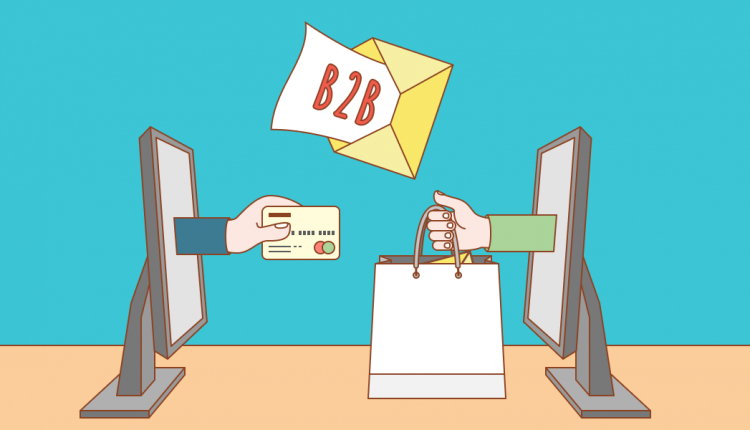What Is A B2B Market and How Is B2B Marketing Important?
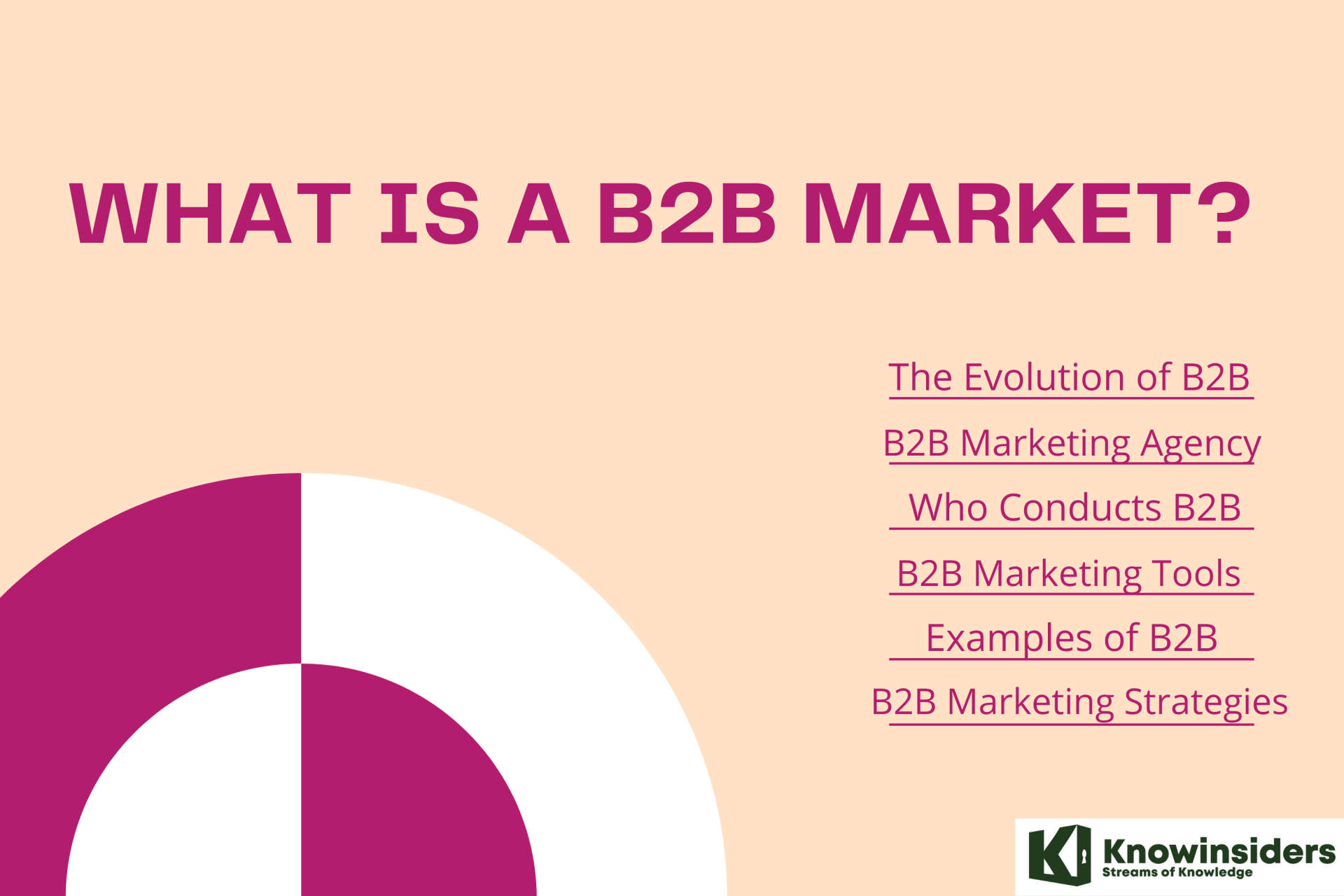 |
| What is B2B marketing? |
Business-to-business (B2B) marketing has an extensive list of the terminology you should be familiar with to fully understand how each piece supports your marketing and business goals. Marketing your products or services to businesses can be difficult. As an individual, you’re very familiar with being marketed to as a consumer, so you have a preconceived idea of how to market to other businesses.
What is B2B marketing?
B2B marketing refers to the techniques and best practices used by companies that sell directly to other businesses. Unlike B2C marketing strategies, which assume the audience is the buyer, B2B marketing has to account for all the different stakeholders who impact business purchases, whether they are executive decision-makers or simply influencers.
Good B2B marketing strategies simultaneously use a variety of tactics to reach multiple audiences at once. They also have to account for longer sales cycles since businesses thoroughly research available options before making a purchase and involve more stakeholders in the decision-making process.
Generally speaking, there is more at stake with a B2B purchase since so much business capital will be tied up in that investment. A group of decision-makers and influencers may need to thoroughly vet each purchase to make sure the product or service fully meets their requirements and delivers tangible ROI.
What Is The Evolution of B2B Marketing?
The Usual Suspects Are Unrecognisable
For one, the target audience has significantly changed. We can’t talk to buyers like we used to, and we can’t always reach them via the tried and tested channels.
The usual suspects, like CEOs, CIO’s, our Product Managers are no longer guaranteed to be mid-lifers with years of experience under their belt. Young, tech-savvy millennials are now in charge, people who grew up surrounded by everything the online world has to offer.
They are fast, dynamic and a growing force. In the US alone, The Department of Labor predicts that by 2025, the workforce will include 74 million of them. Millennials are the new buyers, the people making B2B decisions.
This is an audience that’s used to getting things done digitally. For them, there’s simply no reason for work-related tasks to move offline. It’s B2C tools like videos, social media, or user-generated content that are better at catching their attention. Moreover, 84% don’t even trust the traditional advertising channels.
Face-to-Face Still Matters, But Less
The amount of face-to-face B2B selling is in decline. Gartner's research finds that B2B buyers considering a purchase spend only 17% of that time meeting potential suppliers. When comparing multiple suppliers‚ the time spent with anyone sales consultant can be as low as 5% or 6%.
The language of business has evolved too. If you do get face time with a B2B prospect, you may need to re-think what you say. According to Forbes, even sounding old-fashioned could put a company at a disadvantage.
“.......as workplace cultures evolve and millennials constitute the majority of the workforce….....messages that once seemed professional now feel outdated.”
One way you need to communicate is via social media. That means the tone, content, and format of messages must suit those channels. Punchy and attention-grabbing has definitely replaced staid and overly professional.
Staples has been known to post funny, office life-related tweets. That’s the kind of youthful, human approach that connects with today’s buyers.
What Is a B2B Marketing Agency?A B2B marketing agency is a third-party marketing company that specializes in tailoring your business’s marketing message to other companies. B2B marketing experts understand the subtleties of targeting decision-makers for premium-priced products/services. |
How important is B2B marketing?
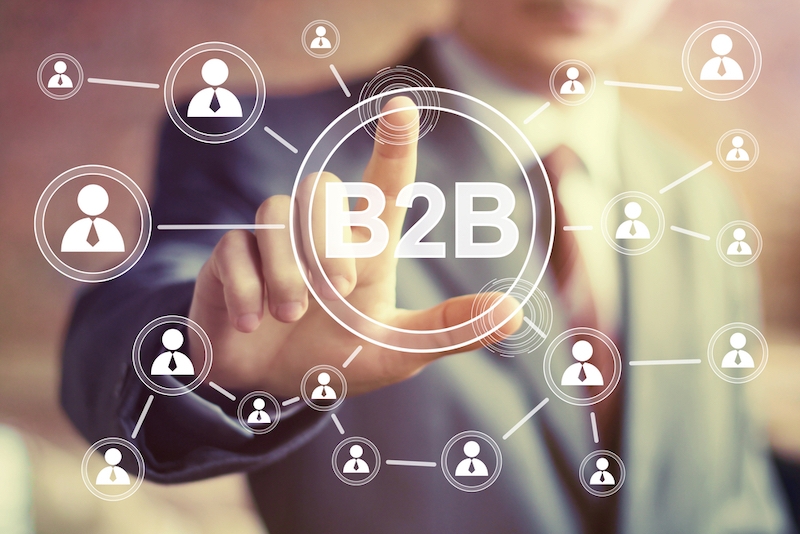 |
| Photo: viecmarketing |
Business-to-business marketing is important because most companies rely on the products or services of other companies to function. It’s very rare that the entire production and distribution process of an organization is 100% self-contained.
For example, your favorite clothing brand likely sources its raw materials from farms and the fabric dies from chemical companies. Your favorite cell phone brand likely purchases the components of their devices from third-party companies and pays shipping companies to distribute the end product.
How are these vendor relationships formed? It all starts with identifying B2B marketing opportunities and then tailoring your brand’s message to a company that needs your products/services.
Another key reason why B2B marketing is important is the length of B2B relationships and the potential for increased revenue. Selling to consumers typically involves a single purchase of a low-cost item. When a business sells to another business, the cost of the good or service may be substantial and necessary on a regular basis.
For example, when a landscaping company sells services to a large office campus, it might involve a contract that spans several months and is worth tens of thousands of dollars. This is quite different from a consumer paying for a one-time landscaping job in their backyard.
Who conducts B2B marketing?
B2B marketing has a whole slew of people working behind the scenes to make sure everything goes according to plan, from the campaign and content marketers to performance and product marketers.
Here’s an overview of the 4 major roles in B2B marketing:
- Campaign marketers - They work with your sales team to plan and execute campaigns that meet your company’s lead generation goals. They launch marketing campaigns and constantly measure and optimize them to increase their effectiveness.
- Content marketers - These marketers create content to attract quality leads to convert into customers. They plan, create and share content that will be of value to their target audience.
- Performance marketers - Their focus is on building brand awareness and generating more revenue for a company. They do this by managing digital advertising on platforms such as Google, LinkedIn, and Facebook.
- Product marketers - They develop messaging and promotional activities based on a company’s product. A key part of their role is to align the wider marketing and sales strategy to the product team’s annual roadmap.
What B2B marketing services are typically available?
B2B marketing services generally focus on certain areas like SEO, content marketing, and account-based marketing. Some vendors will be dedicated to specific industries – healthcare, higher education or financial services, for instance.
Brafton is a content marketing agency, but our approach is pretty exhaustive, incorporating elements of technical SEO, content creation, holistic marketing strategy consultation, industry expertise and account-based marketing tactics.
What are the best B2B marketing tools?
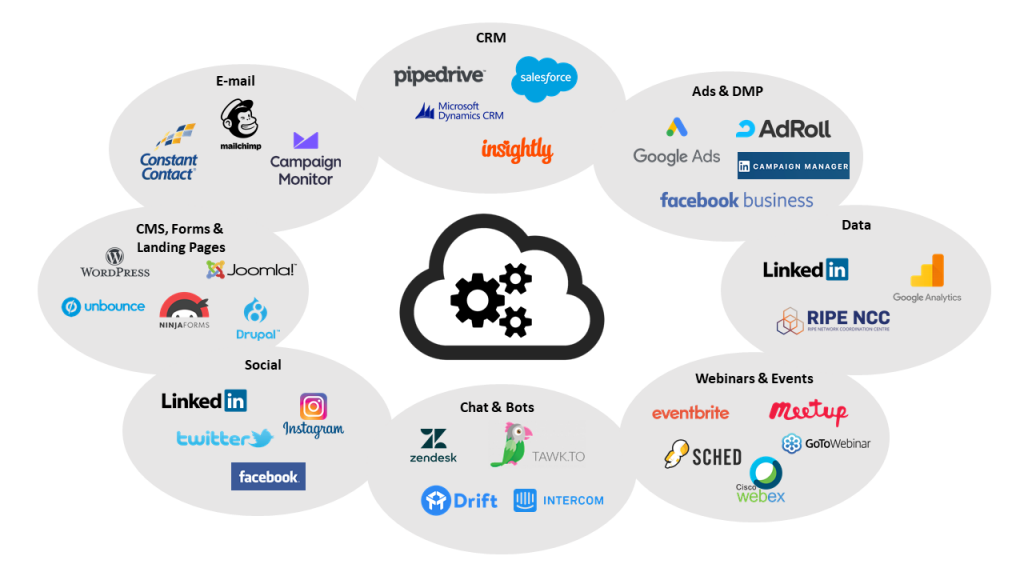 |
| Photo: manceppo |
A lot of marketing applications are designed to address different aspects of digital marketing. Some of the best B2B marketing software we recommend include:
- SEMrush: This keyword research and analysis tool go way beyond similar platforms. It provides a detailed breakdown of search queries, including search volume, competition, and related keywords.
- Unbounce: Improve your conversion rate with this site optimization software. A wealth of landing page design features and A/B testing capabilities enable digital marketers to fine-tune their sites to generate more leads.
- Hubspot CRM: Marketing and sales departments need to coordinate their efforts to close on qualified leads and bring in new accounts. That’s where Hubspot CRM comes in, giving your sales team a detailed timeline of interactions with your leads and helping guide those prospects along through the sales funnel.
- MarketMuse: Create more impactful content with MarketMuse’s AI-driven content planning tools. MarketMuse pulls together keywords, topics, and other recommendations to help guide content production. When you’ve finished your latest landing page, blog or gated content, MarketMuse will run an analysis to predict how well it will perform and suggest any changes that should be made.
- Ahrefs: Competitor analysis is a core aspect of any good B2B marketing strategy. With Ahrefs, you can dig into the market leaders in your specific industry, assessing their tactics, learning from their successful strategies and finding execution gaps you can exploit.
What are some examples of B2B marketing?There are many different ways to approach B2B marketing, many of which are focused on taking advantage of digital channels to increase sales and drive revenue. Inbound marketing is the basis for today’s digital marketing strategies like content marketing and SEO. The main goal is to bring sales prospects to your brand rather than actively seek them out through outbound marketing efforts. SEO makes it easier for Google to crawl your site and boost your search visibility, helping users and sales prospects find your brand website. Content marketing increases your brand awareness, brings your target audience to your digital assets, educates prospects about your services, builds brand trust through helpful guides, and ultimately captures qualified leads. Account-based marketing offers a more granular and focused approach, targeting specific, high-value accounts you want to land, as well as specific people within those companies. |
What are the most important B2B marketing metrics?
If you want to revolutionize the way you do B2B marketing, you’ll need metrics. Tracking your metrics helps you measure your performance and become a better, data-driven marketer.
You can measure everything from email open, read, and success rates to your followers and engagement on social media.
Some of the most important metrics to track are:
- Email - read rates, open rates, and success rates.
- Social - followers, shares, likes, and engagement.
- Paid search - impressions, ad position, cost per impression, and click rate.
- Website and content - content downloads, page views, conversion rates, ROI, and leads generated.
We asked our marketing team for a list of their must-track marketing metrics. Then, we collected them together in an easy-to-digest infographic. Click the image below to download it!
What Are B2B Marketing Strategies?
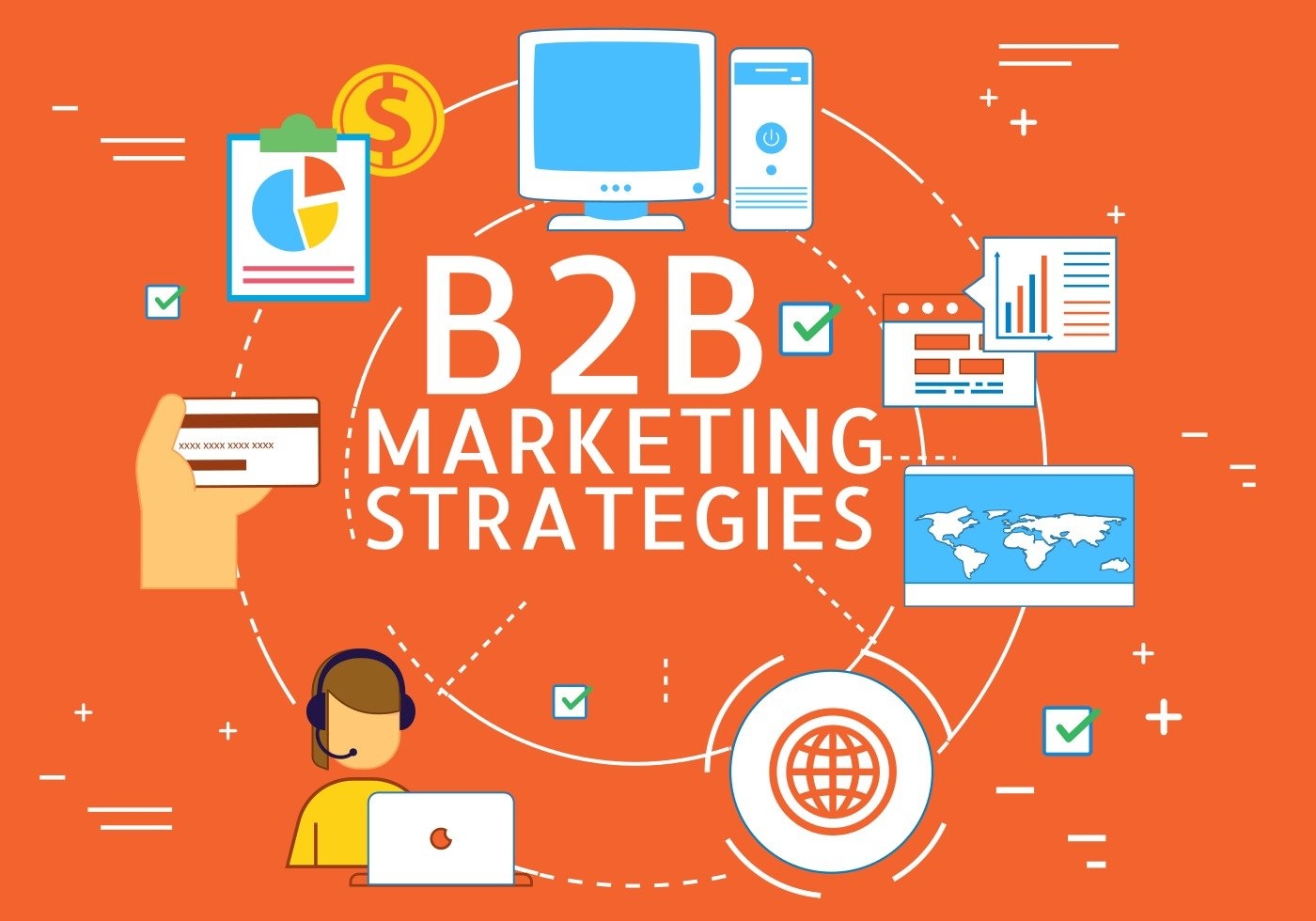 |
| Photo;manceppo |
As I said above, marketing depends on its audience. While B2B and B2C marketing vary, not every piece of B2B marketing material is alike, either.
In this section, we’ll talk about various B2B marketing strategies you can implement to reach your specific business audience. Before we dive in, though, make sure you understand the B2B buyer’s journey. Take note of how each of these stages may affect your marketing strategies and how you implement them.
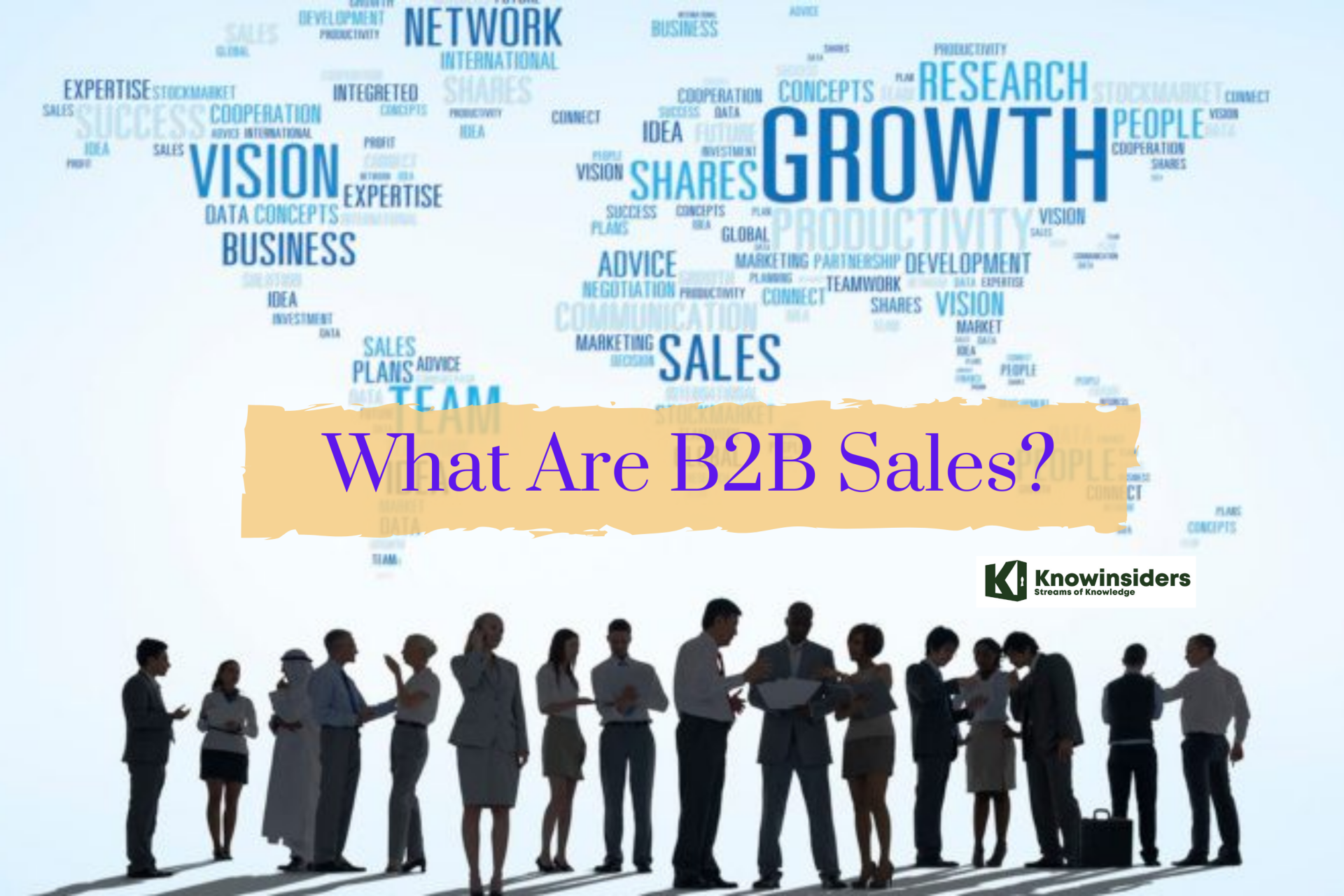 What Are B2B Sales: Types, Tips For Successful Sales What Are B2B Sales: Types, Tips For Successful Sales B2B is short for business to business. What are B2B Sales? To understand more thoroughly about this term, check out right below! |
How to Develop a B2B Marketing Strategy?
Step 1: Lay Out Your Positioning in the Market
Marketers know that in order to set reasonable goals and decide how you’ll achieve them, you need to understand the market you’re operating in. That includes:
-
Competitors: Their positioning in the market and their strengths and weaknesses
-
Your own unique value proposition
-
Where that value proposition situates your business among the patchwork of companies in the market
Your competitive analysis may identify a particular opportunity in the market (price, for example) that only your business solves. That’s your unique selling proposition.
Step 2: Explain Your Target Market and Buyer Personas
The next step is to dig into the who of your market: your target audience. You should have, or find answers to:
-
Who are the people you’ll market to? How old are they? Where do they live?
-
What do you know about them? What are their pains? How does your business solve those?
-
Are they all similar or do they fall into separate buckets or personas?
-
Are they different from the companies your competitor's targets? How?
-
Where do they hang out? Where can you reach them, both on- and offline?
Your marketing strategy needs to include an in-depth profile of the people you’re trying to sell to—otherwise, you don’t know how to sell to them.
Step 3: Set Goals
After pulling together the foundational information in the first two steps, you’re ready to start goal-setting. While we could write an entire ebook on setting goals for B2B marketing, we aren’t here to do that. For our purposes today, your marketing goals should be:
-
Made in conjunction with the sales team
-
Laid out on a timeline (e.g. goals for the next month, quarter, year, etc.)
-
Relatively easy to measure and gauge success
-
High-level—you’ll get into more nitty-gritty marketing success metrics in the strategy for each tactic
Step 4: Outline the Tactics You’ll Use and Create a Plan for Each
In this last step, all of those articles that list marketing tactics can finally be of some use. That said, the tactics your team will use to fulfill the goals from step three shouldn’t be pulled out of a hat. Your goals should dictate the tactics that can most effectively get there—and they can and should be an evolving mix that gets tested and tweaked and optimized.
For a really basic example, if one of your goals is to increase brand awareness among Gen Z, you probably don’t need to worry about advertising in print newspapers. And if your target personas are in the tech space, you probably won’t use the content about knitting to attract them.
Each tactic you employ should have its own, more specific strategy outlined, too. That includes:
-
Channel-specific success metrics and goals
-
A tactical plan for campaigns and assets
-
An explanation of how each tactic fits into the buyer’s journey and works with your other marketing efforts to turn potential customers into actual ones
The most well-known online B2B marketplacesThere aren’t a lot of notable B2B marketplace platforms out there today, mainly due to the intricacies of building the technology and gaining a trustworthy reputation over years. In no particular order, here are some of the top B2B multi-vendor marketplaces:
It is worth doing more research to see if any of those top marketplaces have the buyer base and popularity, technology and tools, and other value-added services that serve your specific selling goals. Or, you may find other types of marketplaces in your niche. |
 What Are Computer Viruses And How Do They Spread? What Are Computer Viruses And How Do They Spread? Computer viruses can be a nightmare with so many people in the world using computers. So what it is, how it spread and how to ... |
 What Is Cloud Computing And How Does It Work? What Is Cloud Computing And How Does It Work? What is cloud computing and how is it important? Whether you’re looking to become a cloud engineer or you’re a manager wanting to gain more ... |
 What is Business Insurance: Definition, Types and Cost What is Business Insurance: Definition, Types and Cost Business Insurance is one of the most important parts if you want to start a business, which will help protect your businesses against losses. |



